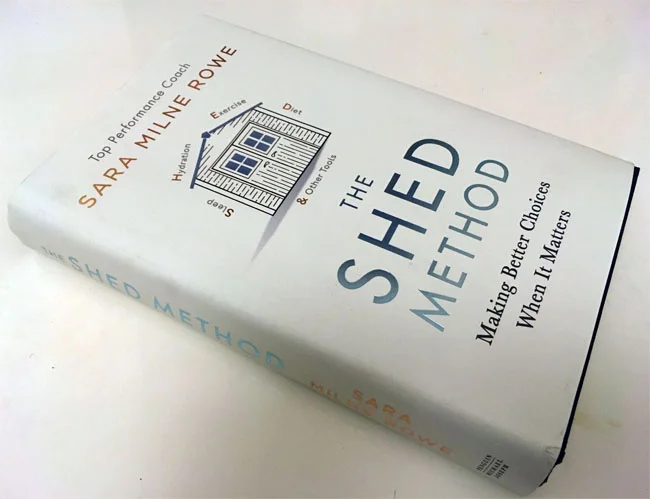December is a challenging month on all fronts – professional and personal – that it can be easy to get lost in all the activity and things to be done and forget to look after yourself. All this month on the blog I’m going to be taking self-care as my inspiration and looking at ways you can look after yourself a little better. I’m going to be sharing ideas for finding energy and preparing for the new year in your creative practice, and suggesting ways to support your mental wellbeing. No matter how much you’ve got going on with work and family this month, the goal is to reach January feeling fresh and ready for the new year, not exhausted and in need of recuperation.
Today I’m looking at a fundamental aspect of managing your personal wellbeing: nourishment
I heard about this book – The Shed Method. Making Better Choices when it Matters – while I was listening to an interview with its author, Sara Milne Rowe, on the 21st Century Creative podcast. Sara sounded very positive, engaging and down-to-earth so I thought I’d give it a go. I’m not usually one to buy a book that seems so obviously to claim it will change your life. On the jacket it’s described as a ‘ground-breaking series of practices and personal routines to help you make better choices’. Well, I’m afraid I’m not so easily convinced by these kinds of claims and I’m not sure that the book does deliver ‘ground-breaking’ but it does deliver the sort of stuff that we probably already know, that we know we know, and we know we should do (but usually don’t). It’s a good reminder of how important simple things are and how looking after ourselves has far reaching consequences.
The book tries to cover a lot of ground, but basically it can be boiled down to this: we don’t have as much control over our brains as we’d like to think we do. There are bits of it that act on impulse, without much of a filter, and that often gets us into trouble or gives us problems. Sara outlines a way of thinking about these different parts of the brain (the human brain, the dog brain and the reptile brain) and how they interact. She also gives us ways to identify when one part may be acting too quickly, not allowing the others to get involved, and tools to help quieten or to enlist the different parts to act.
Sara likens these 3 different parts of the brain to the main characters on the stage of our lives. These characters are supported by a cast of 5 performance energies that are just waiting to come on stage and play their part. These energies are the Body, Mood, Mind, Purpose and People energies. And this is the crux of her ideas – the way we manage these energies has a profound effect on how we make choices and therefore, how we do the things we say we will, or say we want to. In a nod to Maslow’s hierarchy of needs, she tells us that the different energies need to be addressed in order – Body before Mood, and Mind before Purpose and People. The majority of the book then looks at the different energies in order and how we can learn to decipher how well our own energies are doing, and ways to increase them when we need to.
What I like most about the book is how it outlines a very simple approach to self-care that I have found particularly helpful: the Shed Method. Despite this being the title of the book it’s easy to overlook its significance with all the talk of brains and energies. The ‘Shed’ in question refers to Sleep, Hydration, Exercise and Diet – the essentials that we need to keep in balance in order for us to function well. This is stuff we all know. But, do we follow the advice? Rarely. I know from personal experience that I am always dehydrated. It’s just something I find hard to manage, but it can have terrible repercussions if I don’t pay attention (I suffer from migraines). However, I always worry more about Diet and Exercise (I’m lucky that Sleep is ok at the moment) and often put too much effort into those areas of my life, so that the balance is off in others. What the Shed Method has reminded me is to take an overview of all areas, to ask myself – how is my sleep this week? Are there any issues for me regarding how well or easily I’ll be able to keep hydrated or fed? Do I need to do more exercise or are things ok? It’s a handy tool for getting a holistic sense of my wellbeing.
It’s a useful book to read (although until it comes out in paperback in January I’m not sure I’d recommend buying it) especially at the beginning of a month like December when it’s so easy to just slip out of good habits, to ignore the signals that we need to pay attention to ourselves, to over indulge and not stay active. If you find yourself stretched or stressed this month, consider checking your Shed and seeing what steps you can take to ease things a little.
